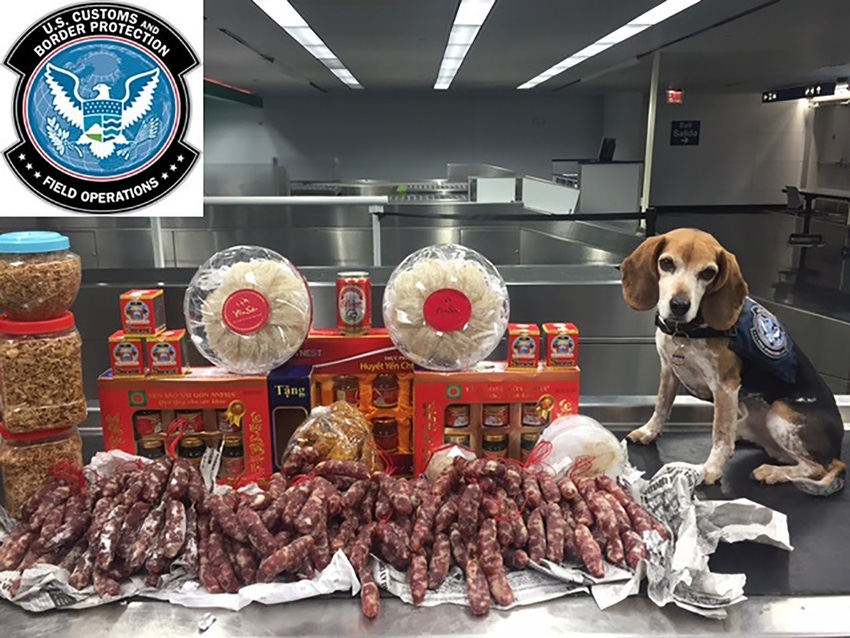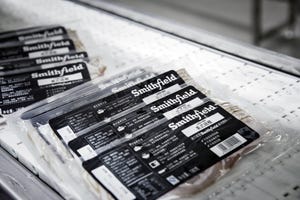Last week the Senate passed a bill authorizing the annual hiring of 240 agricultural specialists until the shortage is filled. Now we wait on the House.

Occasionally at National Hog Farmer, we share the latest pork busts the U.S. Customs and Border Protection has made at a port of entry while trying to protect our nation’s agriculture sector and economic security. For example, last month, CBP agriculture specialists and officers intercepted 99 pounds of pork, poultry and heroin during an examination of a passenger vehicle at Juarez-Lincoln Bridge. The month before that, agricultural specialists at Dallas-Fort Worth International Airport seized Vietnamese oranges, rice crackers with dry shredded pork, 2.2 pounds of mooncakes with pork meat and 3.5 pounds of onion bulbs.
These are just a fraction of the prohibited plant and animal products CBP agricultural specialists and their canine units discover each day, but we need more of them on staff. Why? If a foreign animal disease such as foot-and-mouth disease, African swine fever or classical swine fever were to enter the U.S. swine herd, it would cause billions of dollars in losses due to animal deaths, depopulation, disposal and cleanup costs. And all it would take is a passenger getting through CBP with an ASF-infected pork product, discarding it an area where pigs, most likely the feral population, can get to it and the next thing you know the United States is declaring itself ASF-positive.
It may sound farfetched to the average traveler, but according to a recent University of Minnesota College of Veterinary Medicine study, the risk of ASF arriving in the United States has nearly doubled since 2018. The researchers also say there’s a high probability that the ASF virus has actually reached our borders through the smuggling of pork products; however, due to the work of CBP, the virus has not made it through a port of entry.
The National Pork Producers Council has made it a top priority this year to get more agricultural specialists and canine teams in place. The NPPC requested that Congress, through the Homeland Security and Agricultural Appropriations Committees, provide critically needed funding for 600 new CBP agricultural inspectors.
That request has not fallen on deaf ears. The Senate came through last week, passing the Protecting America’s Food & Agriculture Act of 2019. The Protecting America’s Food & Agriculture Act of 2019 authorizes the annual hiring of 240 agricultural specialists until the workforce shortage is filled, and 200 agricultural technicians a year to carry out administrative and support functions. The bill also authorizes the training and assignment of 20 new canine teams annually and authorizes supplemental appropriations each year to pay for the activities of the agriculture specialists, technicians and canine teams.
Since that announcement last Friday, Bon Jovi’s “Living on a Prayer” has been playing in my head.
Rep. Filemon Vela [D-Tx-34] has introduced a similar bill in the House, H.R.4482 — Protecting America’s Food and Agricultural Act of 2019, and it has since been referred to the House Committee on Homeland Security and the House Committee on Agriculture. I’ve reached out to Vela’s office, but no word yet on when to expect a vote on that or if there are plans to essentially combine the House bill and the Senate bill or to pass the bill as an amendment on another larger effort, such as a funding measure.
Even after the House passes the bill, I know we will still need President Trump to sign it into law, but I’m still finding myself humming “we’re halfway there.” The CBP is the first line of defense in protecting American pork production and the rest of agriculture from foreign diseases and the more boots and sniffers at our land, air and sea-based ports of entry, the better. I may be “living on a prayer” but I hope by the end of the year the legislation has been signed into law and CPB is able to start hiring.
About the Author(s)
You May Also Like




